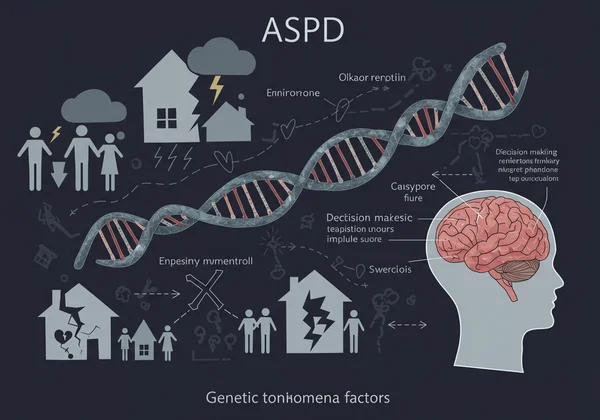Antisocial Personality Disorder Test: Symptoms & Next Steps
October 27, 2025 | By Samuel Bishop
Have you ever wondered about a persistent pattern of behavior in yourself or someone you know that involves a disregard for others' rights, impulsivity, and a seeming lack of remorse? Grappling with these questions can be confusing and isolating. How do I check if I have a personality disorder? This question often leads people to search for a reliable personality disorder test online. Navigating self-discovery can be overwhelming. Yet, understanding the signs and traits of conditions like Antisocial Personality Disorder (ASPD) is a crucial first step toward awareness and potential for change. An online personality disorder test can serve as a valuable preliminary tool to guide your self-reflection.
This article will provide a clear, empathetic overview of Antisocial Personality Disorder, exploring its core symptoms, potential causes, and the responsible next steps you can take after gaining initial insights. Our goal is to equip you with the knowledge to move from uncertainty toward understanding. For a confidential starting point, you can explore your traits.

What is Antisocial Personality Disorder (ASPD)?
Understanding ASPD requires looking beyond simplified labels often seen in popular media. It is a complex mental health condition characterized by a long-term pattern of manipulating, exploiting, or violating the rights of others without any remorse. It is not just about being "antisocial" in the colloquial sense of being introverted or shy; it is a clinical condition with specific diagnostic criteria.
Defining ASPD: A Cluster B Personality Disorder
Antisocial Personality Disorder is categorized as one of the cluster b personality disorders in the Diagnostic and Statistical Manual of Mental Disorders (DSM-5). This cluster is known for behaviors that are dramatic, overly emotional, or unpredictable. Alongside ASPD, this group includes Borderline Personality Disorder (BPD), Narcissistic Personality Disorder (NPD), and Histrionic Personality Disorder (HPD). Individuals with these disorders often struggle with impulse control and emotional regulation, which significantly impacts their relationships and daily functioning. A key feature of ASPD within this cluster is the pervasive disregard for social norms and the rights of others.
Core Features of ASPD: A Lack of Empathy and Remorse
At the heart of ASPD is a profound lack of empathy. An individual with strong ASPD traits may be unable to understand or share the feelings of another person. They might see others as instruments to be used for their own gain. This is often coupled with a lack of remorse; they may feel no guilt or regret after hurting someone, lying, or breaking the law. Other core features include:
-
Deceitfulness: Repeated lying, using aliases, or conning others for personal profit or pleasure.
-
Impulsivity: A failure to plan ahead, leading to sudden decisions and actions without considering the consequences.
-
Aggressiveness and Irritability: A history of physical fights or assaults.
-
Consistent Irresponsibility: Repeated failure to sustain consistent work behavior or honor financial obligations.

Recognizing ASPD Symptoms: Based on DSM-5 Criteria
Identifying the signs of any personality disorder requires careful observation of long-term patterns, not just isolated incidents. The ASPD symptoms outlined by the DSM-5 provide a clinical framework for understanding this condition. It's important to remember that only a licensed professional can make a diagnosis, but being aware of these criteria can help you determine if seeking professional help is a necessary next step. Taking a free personality disorder test can be a good starting point for this reflection.
Common Behavioral Patterns in Adults with ASPD Traits
The official DSM-5 criteria state that a person must be at least 18 years old for a diagnosis and must have shown evidence of Conduct Disorder before age 15. The pervasive pattern of disregard for and violation of the rights of others is indicated by three (or more) of the following:
- Failure to conform to social norms with respect to lawful behaviors, as indicated by repeatedly performing acts that are grounds for arrest.
- Deceitfulness, as indicated by repeated lying, use of aliases, or conning others for personal profit or pleasure.
- Impulsivity or failure to plan ahead.
- Irritability and aggressiveness, as indicated by repeated physical fights or assaults.
- Reckless disregard for the safety of self or others.
- Consistent irresponsibility, as indicated by repeated failure to sustain consistent work behavior or honor financial obligations.
- Lack of remorse, as indicated by being indifferent to or rationalizing having hurt, mistreated, or stolen from another.
For example, an anonymized scenario might involve someone who frequently changes jobs because they get into arguments with coworkers, has a history of minor legal troubles they brush off as "no big deal," and consistently borrows money from friends with no intention of paying it back, feeling no guilt about the friendships they damage.
The Roots of ASPD: Exploring Potential Causes and Risk Factors
Many people ask, "What can trigger a personality disorder?" For ASPD, there is no single answer. Research suggests a complex interplay of genetic, environmental, and neurological factors.
-
Genetic Factors: There appears to be a hereditary component. Having a close relative with ASPD may increase one's risk.
-
Environmental Factors: A chaotic, unstable, or violent family life during childhood is a significant risk factor. Experiencing childhood trauma, neglect, or abuse can contribute to its development. A diagnosis of Conduct Disorder in childhood or adolescence is a primary precursor to an ASPD diagnosis in adulthood.
-
Neurological Factors: Some studies suggest that individuals with ASPD may have differences in brain structure and function, particularly in the areas responsible for decision-making, empathy, and impulse control.

Taking an Antisocial Personality Disorder Test: Your First Step
If these patterns and symptoms resonate with you, the idea of taking a personality disorder test can feel daunting. However, a preliminary screening is an empowering first step toward gaining clarity. It provides a structured way to reflect on your experiences and behaviors in a private, non-judgemental setting. A scientifically-informed screening can help organize your thoughts before deciding whether to speak with a professional.
What an Online ASPD Screening Can Offer You
An online screening tool, like the one offered here at our platform, is designed to be a preliminary measure. It is not a clinical diagnosis. Its purpose is to help you identify potential indicators that may warrant further investigation. The benefits include:
-
Confidentiality: You can answer personal questions in a secure and private environment.
-
Accessibility: It is a convenient and easy way to begin your journey of self-reflection from home.
-
Insight: The results provide a summary of traits and patterns that may align with ASPD, offering you a starting point for discussion with a mental health expert.

Beyond the "Sociopath Test": Seeking Professional Guidance
While many search for a sociopath test online, it is crucial to understand that terms like "sociopath" and "psychopath" are not official clinical diagnoses in the DSM-5. They are often used to describe severe manifestations of ASPD. The most reliable path to understanding your mental health is through a professional diagnosis.
No online test can replace a comprehensive evaluation by a qualified mental health professional, such as a psychiatrist or a clinical psychologist. They use structured interviews, clinical observation, and sometimes collateral information from others to make an accurate diagnosis. If your screening results from our online personality disorder test indicate potential concerns, the next logical step is to schedule an appointment with a professional.
Moving Forward: From Self-Awareness to Professional Support
Understanding the complexities of Antisocial Personality Disorder is a journey that begins with self-awareness. Recognizing the patterns of behavior, understanding the clinical criteria, and acknowledging the need for further exploration are powerful acts. While the road to managing ASPD traits can be challenging, early identification and professional support can make a significant difference in improving one's quality of life and relationships.
Are you ready to take the first step toward clarity? Take the free, confidential Antisocial Personality Disorder Test for initial insights and to explore your next steps.
Frequently Asked Questions About ASPD and Testing
How do people with ASPD typically behave in relationships?
Relationships with individuals exhibiting strong ASPD traits can be challenging and often unstable. Because of a lack of empathy, they may struggle to form genuine emotional connections. They can be charming and manipulative to get what they want but may become cold, dismissive, or aggressive when their needs are not met. They often struggle with long-term commitment and responsibility, leading to tumultuous romantic, platonic, and professional relationships.
What is the most accurate way to get tested for Antisocial Personality Disorder?
While an online personality disorder test is an excellent starting point, the most accurate method is a comprehensive clinical assessment conducted by a qualified mental health professional, like a psychiatrist or psychologist. This involves a detailed interview about personal history, behavior patterns, and symptoms. It cannot be accurately diagnosed through a short online quiz alone.
Can an online test provide a definitive diagnosis for ASPD?
No, an online personality disorder test cannot provide a definitive diagnosis. Our platform offers a scientifically-informed screening tool designed for initial self-assessment and educational purposes. It helps identify potential traits that may suggest the presence of a personality disorder. A formal diagnosis must come from a licensed professional who can consider the full context of an individual's history and symptoms.
What is the difference between ASPD and psychopathy or sociopathy?
ASPD is the official clinical diagnosis listed in the DSM-5. "Psychopathy" and "sociopathy" are older, non-clinical terms used to describe more severe forms of ASPD. Psychopathy is often characterized by a complete lack of empathy and calculated, predatory behavior. Sociopathy is sometimes used to describe individuals whose antisocial behavior stems more from environmental factors and may be capable of forming some attachments. However, both fall under the umbrella of ASPD.
Are there effective treatment options available for Antisocial Personality Disorder?
Treating ASPD is challenging, largely because individuals with the disorder often do not believe they need help. However, long-term psychotherapy, such as Cognitive Behavioral Therapy (CBT), can be effective for some. Therapy may focus on managing anger and impulsivity, developing a sense of empathy, and understanding the consequences of one's actions. There are no medications specifically for ASPD, but they may be prescribed to treat co-occurring conditions like anxiety or depression. The first step is acknowledging the pattern, which a free online screening can help initiate.